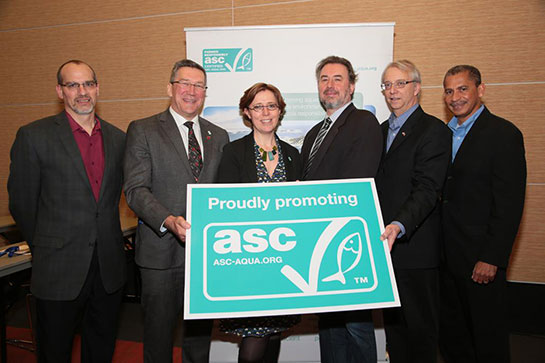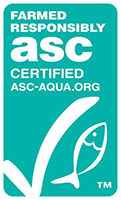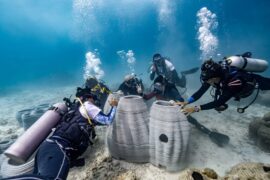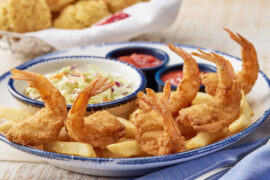The Aquaculture Stewardship Council (ASC) brought together a distinguished panel for this year’s Seafood Expo North America in Boston, Massachusetts, USA, to join in the discussion on what drives environmental and social responsibility in aquaculture.
On the second day of the show, March 16, the ASC session was opened by CEO Chris Ninnes, who demonstrated some of the big commitments made to the program, bringing the session to life with a preview of a new ASC film showing how 30 farms in the Brazilian state of Rio de Janeiro are dedicated to gaining ASC certification in readiness to supply the upcoming Rio 2016 Olympics.
“It’s these types of commitments that have the power to really drive improvements in aquaculture,” Ninnes explained, referring to pledges from the Global Salmon Initiative and the Rio 2016 Organizing Committee.
“There are now 127 ASC-certified farms in the ASC program and a further 67 in assessment,” said Ninnes. “Given the anticipated growth, it is important that the aquaculture industry manages its practices responsibly. And, it’s through these combined efforts that we can achieve the biggest impact reduction.”

Partner Commitments Driving Change
ASC’s Commercial Marketing Manager Esther Luiten presented the latest market figures, revealing ASC has breached the 2,000 products mark – a 110% increase in approved ASC-certified products since last year.
“This growth demonstrates the commitment of farms and supply chain businesses to improvements in environmental and social responsibility and the ASC program,” Ninnes said. “And, honestly, it couldn’t have been achieved without their hard work and dedication. We now have more than 480 businesses that have chain of custody certification, 42 of these are in North America.”
Working Together
A panel discussion moderated by Micheal Tlusty, director of Ocean Sustainability Science, New England Aquarium, also took place. Panelists shared their views on how the ASC program and farms contribute to transforming the aquaculture industry, how producers are driving change and improving their performance and the role of supply chain partners.
Clare Backman, public affairs director at Marine Harvest Canada, said the company spent many years making fundamental changes to its business to prepare for the strict ASC standards. “For example, we invested in new high-strength netting material that keeps our fish in and eliminates the need for chemical antifoulants, and we’ve reduced marine meal in our fish feed so we are now net producers of fish protein,” Backman said.
In January of this year, Marine Harvest Canada became the first in North America to have a salmon farm achieve ASC certification.
Alvin Henderson, a member of the Belize Shrimp Growers Association, described the rewarding journey the eight shrimp farms took in seeking ASC certification. “The main hurdle was building capacity, and we had to work hard on creating the right culture to manage compliance,” Henderson said.
“These farms represent 90% of Belize’s shrimp production. Most of the farms are small operations, but we had support from outside investment,” he added. “But, no matter what, we’re committed to meeting the ASC standards. For us it’s been an amazing journey that has helped us grow responsibly as a group.”
Fraser Rieche, sustainability director for the distributor and wholesaler Calkins & Burke Ltd, shared his views on the role of the supply chain and the importance of sourcing responsible seafood for Calkins. “From my perspective, which is that of a trader, it will be much easier for me when certified product sustainability is the new normal,” he said.
About ASC
The Aquaculture Stewardship Council (ASC) is an independent, not-for-profit organization founded by World Wildlife Fund (WWF) and the Sustainable Trade Initiative (IDH) in 2010 to manage the certification of responsible fish farming across the globe. ASC standards require farm performance to be measured against both environmental and social requirements. Certification is through an independent third party process and (draft) reports are uploaded to the public ASC website.
The on-pack ASC logo guarantees to consumers that the fish they purchase has been farmed with minimal impacts on the environment and on society.





